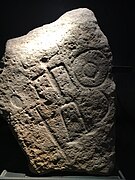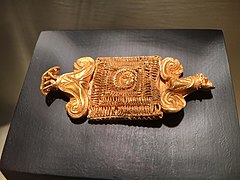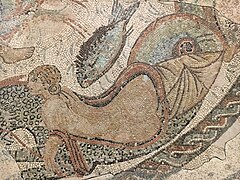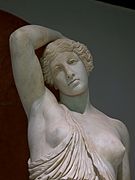Municipal History Museum of Écija
Museo Histórico Municipal de Écija | |
 | |
 | |
| Established | November 1997 |
|---|---|
| Location | Plaza de la Constitución, Écija, Spain |
| Type | History museum, archaeological museum |
| Owner | Ayuntamiento de Écija |
| Official name | Palacio de los Marqueses de Benamejí |
| Type | Non-movable |
| Criteria | Monument |
| Designated | 1994 |
| Reference no. | RI-51-0008775-00000 |
The Municipal History Museum of Écija (Template:Lang-es) is a history museum in Écija, Spain, mainly dedicated to archaeology.
History
Hosted at the Benamejí Palace, an instance of the local Baroque architecture,[1] the museum is owned by the municipality and operated by a municipal foundation.[2] It began operation in November 1997.[3] The first archaeology section opened in 1999.[2] The museum joined the regional register of museums of Andalusia in 2000.[2]
Pieces
Among the items exhibited at the museum, standout collections include the set of Roman mosaics from Astigi (one of the largest from Hispania), Roman sculpture (including the iconic wounded amazon), the anthropologic collection from the Late antiquity and the Al-Andalus period, the Roman epigraphy, a number of warrior stelae and the pre-Roman Écija Plaque found in the surrounding campiña.[4]
-
Warrior stele from Atalaya de la Moranilla
-
Écija Plaque
-
Detail of the Roman mosaic of the Nereids
-
Detail of the wounded amazon
References
- Citations
- ^ González Beviá et al. 2002, pp. 217–218.
- ^ a b c Fernández Ugalde 2017, p. 478.
- ^ Rodríguez, Manuel (29 November 2017). "Veinte años de la galería municipal que antes fue cuartel". El Correo de Andalucía.
- ^ Fernández Ugalde 2017, p. 481–482.
- Bibliography
- Fernández Ugalde, Antonio (2017). "Museo Histórico Municipal de Écija" (PDF). Boletín del Museo Arqueológico Nacional. 35. Madrid: Museo Arqueológico Nacional: 476–485. ISSN 2341-3409.
- González Beviá, Fernando J.; Martín Sanjuán, Fernando; Romo Salas, Ana; García Dils de la Vega, Sergio (2002). "La política municipal de protección del patrimonio histórico". Revista PH. 38. Seville: Instituto Andaluz del Patrimonio Histórico. doi:10.33349/2002.38.1337.




